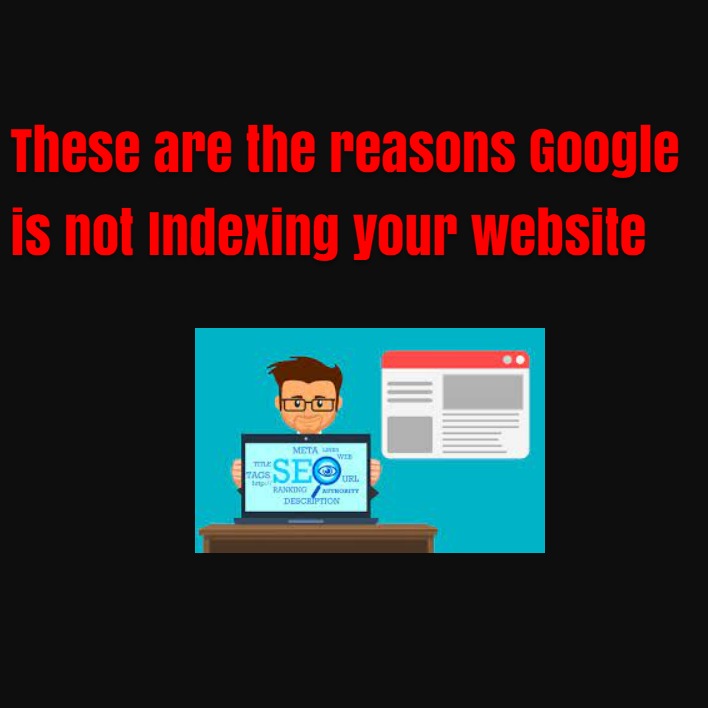Google Is Not Indexing Your Website: These are the 13 reasons Google is not Indexing your website [Solution]

Google Is Not Indexing My Website But Why:
There are many possible factors that may obstruct Google from indexing your web pages, and this article covers some of them.
You may want to know what to do if your site is not mobile-friendly or has complex indexing issues, we’ve got the details you need.
The earlier you learn how to fix these usual problems so that Google can start indexing your pages again, the better for your website.
These are the reasons Google is not indexing your website. see them below:
1. You May Not Have A Domain Name
The first reason Google is not indexing your website is that there’s no domain name. This could be because you are not using the correct URL for the content, or the settings on WordPress might not be correctly set up.
There are some possible solutions if you are experiencing these.
Check whether or not your web address starts with “https://XXX.XXX…” which means that someone might have typed in an IP address instead of a domain name and got redirected to your website.
Also, your might have not configured your IP address redirection correctly.
One process to fix this matter is by adding 301 directs from WWW versions of pages back onto their respective domains. If people get directed here when they try to search like [yoursitehere], we want them to land on your proper domain name.
It’s essential to ensure that you have a domain name. This is non-debatable if you want to be among the top-ranked websites on the Google search engine and be competitive on Google.
2. Your Site has no mobile-friendly version
A mobile-compactible site is very important in getting your website indexed by Google since Google introduced Mobile-First Indexing. A non-mobile-friendly website is another reason Google Is Not Indexing Your Website.
No matter how great the content on your site is, if it’s not effective for viewing on a smartphone or tablet, you’re going to lose rankings and queue.
Mobile optimization doesn’t have to be difficult – simply making it have a flexible design concept like fluid grids and CSS Media Queries can go a long way towards making sure that users will find what they need without noticing any redirection problems.
The first thing I suggest you do in this matter is running your site through Google’s Mobile-Friendly Testing Tool.
If your webpage doesn’t get “ the 70% passed reading,” you have some more work to do to make your site mobile-friendly.
3. Too Complex Coding Lnaguage is Another Reason why for Google Is Not Indexing Your Website
Google won’t index your website if your coding language appears in a complex way. It doesn’t matter what the language is – it could be old or even updated, like JavaScript – as long as the settings are not correct and cause crawling and indexing issues.
If this is difficult for you, I advise running your site through Google’s Mobile-Friendly Testing Tool to see how mobile-friendly your website is (and make any adjustments that might need to be made).
If your website isn’t up to their standards yet, they offer many resources with suggestions about all manner of design tips that can come up while designing a responsive website.
4. Your Site Loads Slowly is Another Reason Google Is Not Indexing Your Website
Google is not interested in bringing up a website that loads slowly to appear in the top outcome of their index. If it takes a long time for your site to load, it may be the result of some opposing elements.
It might be that you have too much content on the page for a user's browser to handle or you may be using an old-fashioned server with limited resources.
Solutions:
- Use Google Page Speed Insights – This is one of the preferred tools I’ve found in recent years and helps me recognize what sections of the website need quick attention when improving its speed. The tool examines your webpage against five performance best practices (that are crucial for having faster loading sites), such as reducing payload size, leveraging browser caching, minimizing connections, etc., and will give you suggestions about how you can improve each sector of your site.
- Use a tool like webpagetest.org – This tool shows if your website loads at a fast race pace. It will also enable you to see in detail the specific elements on your site that are causing you issues. Their waterfall can help you pinpoint extraordinary page speed issues before they cause serious problems.
- Use Google’s Page Speed insights again – See where you can make enhancements to load times on the site. Searching for a new hosting idea with more measures can be important (pure dedicated servers are far better than shared ones) or using a CDN service that will serve as fixed content from its store in several positions around the world.
It is preferred that your page speed numbers hit 70 or more. Making it as close to 100 as possible is preferable.
5. Your Site Has Little Well-Written Content Yet Another Reason Google Is Not Indexing Your Website

Well-written content is not a criterion for succeeding on Google. If you have minimal content that does not at least meet your competition’s levels, then you may have significant issues even breaking the top 50.
In my experience, if the website content is less than 1,000 words, it does not do as well as content that is more than 1,000 words.
Well-written content is a key to success as the conclusion of your context for your site in the competition.
Your website needs to contain creative and informative content.
Your context must strive to provide answers to searched questions, providing the necessary information needed and also be different from other sites' views.
If your site doesn’t meet those requirements, Google will likely find another site with better quality content that does.
If it marvels you why your site is not ranked high in Google search results for certain keywords despite going through with SEO accurate practices like adding important keywords throughout the text (Hint: Your Content), then one mistake may be thin pages where there really should be more than just 100 words per page!
Thin pages can cause indexing problems because the needed solid content and the minimum content quality are not there.
6. Your Site Is Not Friendly And AppealingTo Visitors Is Another Reason Why Google Is Not Indexing Your Website

Having a user-friendly and engaging site is crucial to good Search Engine Optimization. Google ranks your site higher in the search results if it is easy for visitors to find what they want and also go around the website without having restrictions or being frustrated.
Google doesn’t allow web surfers to spend their whole day on a page that takes too much time to load, has unclear navigation, or presents too many Ads in it.
If one article is listed per division instead of much, then this could be why your content is not being ranked well with Google! It’s vital not only to target keywords within each post but also to make sure that all connected posts link back to other appropriate articles/pages on the topic.
Do people like sharing your blog? Are readers being wowed by your content? Then this could be why Google is not indexing your site.
If someone connects directly to one particular product page instead of using relative keywords like “buy,” “purchase” etc., then there might be an error with the way other pages link back to that particular product.
Make sure all articles listed in the division pages also exist within each respective sub-division so users can easily make purchases without having complex navigation linking hierarchies.
7. Having a redirect Loop in your website Is Another Reason Google Is Not Indexing Your Website
Redirect loops are another regular issue that stops your site from indexing. These are commonly caused by typos and can be corrected with the following steps:
Locate the webpage that is causing the redirect loop. If your website is using WordPress, locate the HTML source of one of your posts on this page or in a .htaccess file and locate the “Redirect 301” to see which webpage the traffic is coming from. Repairing any 302 redirects and making sure they are set to 301 is also worth it.
Use “search” in Windows Explorer (or Command + F if Mac) to search through all files containing “redirect” until you find where the problem is.
There shouldn’t be any copy of the URL address pointing back at itself. then use redirection code like the below:
Status codes such as 404s don’t always come up in Google Search Console. Using a superficial crawler like Screaming Frog, you can find the status codes for 404s and other errors.
Use Google Search Console on-site to crawl the site again and submit it again to indexing. Wait a week or so before checking back in with Google Search Console if any new warnings are popping up that need attention.
Google does not update its indexes every day but tries every few hours which means sometimes your content may not show up right away even though you know it’s been updated. Be patient! It would be indexed soon enough.
8. Using Plugins That Obstructs Googlebot from Crawling Your Site Is Another Reason Google Is Not Indexing Your Website
Such a pattern of the plugin is a robots.txt plugin. If you set your robots.txt file through this plugin to no index in your site, Googlebot will not be able to crawl it.
Set up the robots.txt file and do the following:
Set it as public so that it will give access to crawlers without limitations when you create this.
Make sure that your robots.txt file doesn’t have any of the following lines:
User-agent: *
Disallow: /
The forward slash means the robots.txt file is not allowing all pages from the root folder of the site. You’ll like to make sure that your robots.txt file looks more like this:
User-agent: *
Disallow:
With the overrule line being empty, this is telling crawlers that they can all crawl and index every page on your site without restriction (assuming you don’t have specific pages marked as being noindexed.
9. Your Site Uses JavaScript To Provide Content Is Another Reason Google Is Not Indexing Your Website
JavaScript itself is not always a complex issue that causes indexing problems. There’s not one single rule that says JS is the only thing that causes problems. You have to inspect the individual site and analyze issues to know if this is a problem.
Java Scripts comes into play as an issue when the Java Scripts prevents crawling by doing irregular things – techniques that may be akin to cloaking.
If you have rendered HTML vs. raw HTML, and you have a connection in the raw HTML that isn’t in the given HTML, Google may not crawl or index that link. Your rendered HTML vs. raw HTML issues is critical because of these types of mistakes.
If you’re into keeping out of sight your JS and CSS files, don’t do it. Google has referred that they want to see all of your JS and CSS files when they crawl.
Google needs you to keep all JS and CSS crawlable.
You have to unblock any of the blocked files and allow them for full crawling to give Google access to view your site.
10. All Domain Properties To Google Search Console Was Not Added Is Another Reason Google Is Not Indexing Your Website
In a situation where you have migrated from HTTP:// to HTTPS://, you must make sure all your domain variation is added and verified in the Google Search Console especially when you have more than one variation of your domain.
It is vital to be sure that you aren’t omitting any of your domain standards when adding them to Google Search Console.
Make sure to verify your possession of all domain properties and confirm that you are tracking the right ones and also adding them to Google Search Console.
This likely may not be an issue for websites being created newly.
11. Your Meta Label Are Set To Noindex, Nofollow Is Another Reason Google Is Not Indexing Your Website
Meta tags are sometimes set to noindex, nofollow through sheer bad luck. Let's say, your site may have a link or page that was indexed by Google’s crawler and then deleted before the change to noindex, nofollow was set up correctly in your website’s backend.
The page might not have been re-indexed as the outcome, and if you’re using a plugin to block Google from crawling your site then that page may never be indexed again.
The outcome is simple: change any meta tags with the words noindex,nofollow on them so they read index, follow instead.
This might be a fight ahead of you if you have thousand of these pages like this.
You must summon the courage and move on one of these tasks.
And when your site is now working properly, you will thank yourself in the end.
12. You’re Not Using A Sitemap Is Another Reason Google Is Not Indexing Your Website
You need to use a sitemap!
The sitemap also helps Google to find out the content of your website and also it is a catalog of all pages on your website. It will also ensure that every page is crawled and indexed by Google Search Console.
Google does not see your pages unless they are currently indexed and also receiving traffic if you don’t have a sitemap.
It’s proper to note, however, that HTML Sitemaps are disapproved in Google Search Console. The preferred way for sitemaps nowadays is XML Sitemaps.
You may desire to use your sitemap to tell Google what the essential pages of your site are, and you want to submit it regularly for crawling and indexing.
13. You’ve Been Penalized By Google And Haven’t Cleaned Up Your Act Yet Is Another Reason Google Is Not Indexing Your Website
Google will not indicate your website if you’ve been penalized and had not cleared your act.
It is uncomplicated giving answers to these questions. If it’s penalized by Google, they might not be able to do anything about it. Penalties follow you around like an unrequested friend who drags their feet on the carpet as they walk through each room of your house.
Having some doubts why would you still exclude some information from your website since you’re already in trouble with search engines?
There are ways out of being penalized, although many people may not know how or no longer make changes again. Some also think of just removing pages and striking the old content onto a new site will work just as well, it doesn’t.
If you are subject to penalization, the safest route is to clean up your act from before entirely. And must have all-new content, re-build the domain from the scratch, or do a complete content rebuild.
Google describes that you are expected to take just as long to retrieve your website from penalty as it did for you to fall into one.
14. Your Technical SEO Is Terrible Is Another Reason Google Is Not Indexing Your Website
Buying technical SEO from Fiverr.com is like purchasing a Lamborghini from a dollar store: you’re likely to get a counterfeit item rather than the real thing.
Accurately doing technical SEO is worth it: Google and users will love you.
Let’s see common problems and solutions, and where technical SEO can help you.
See some common problems and solutions and where SEO can help you.
Problem: if your site is not hitting Core Web Vitals numbers
Solution: The technical SEO will help you figure out the problem with your Core Web Vitals and give you a path to correcting these problems. Your faith should not be in a strategic audit – this won’t always help you in these areas. Where you need a technical SEO audit to excavate some of these issues because they can range from the downright simple to the incredibly complex.
Problem: if your site has crawling and indexing issues
Solution: These can be strangely complex and requires a seasoned technical SEO to uncover and repair them. Locate them if you are discovering that you are having zero traction or not getting any performance from your site.
You don’t have to accidentally tick the “discourage search engines from indexing your website” box in WordPress.
Problem: if your site’s robots.txt file is somehow accidentally blocking crawlers from critical files
Solution: Technical SEO is here to take you from the abyss. Most sites are so deep that you may not see a way out other than removing the site and starting over. Their nuclear option is not always the best. The technical SEO professional is worth their weight in this aspect.
Identifying Website Indexing Problems Are Opposition, But Well Worth Solving
Technical SEO, content, and links are vital to keeping your website’s implementation orientation. If your site has indexing issues, the other SEO elements will help you so far.
Tick off all the boxes and make sure you are really giving your website out in the most correct and attractive approach.
Don’t forget to make good use of your page site for important research! Be sure that your technical SEO is worth it. The more Google can crawl, index, and rank your site, the better your results will be.
Google (and your website’s traffic) will thank you.
Now that you know the Reasons Google Is Not Indexing Your Website and their fix, I hope you will fix them all so that Google can start indexing your website.